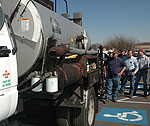New courses offer ground-floor training on seal coats
 With a tight budget and thousands of miles of paved roads to care for, the importance of effective preventive maintenance is a priority for the Texas Department of Transportation (TxDOT). Seal coats, the process by which a layer of liquid asphalt is applied to an existing roadway and then covered with aggregate, play an important role in TxDOT’s preventive maintenance program.
With a tight budget and thousands of miles of paved roads to care for, the importance of effective preventive maintenance is a priority for the Texas Department of Transportation (TxDOT). Seal coats, the process by which a layer of liquid asphalt is applied to an existing roadway and then covered with aggregate, play an important role in TxDOT’s preventive maintenance program.
 The Texas Pavement Preservation Center, a joint collaboration of the Center for Transportation Research (CTR) of The University of Texas at Austin and the Texas Transportation Institute (TTI), recently completed a series of seal coat training courses for TxDOT employees. The courses were based on a revised curriculum created from the recently updated Seal Coat Manual.
The Texas Pavement Preservation Center, a joint collaboration of the Center for Transportation Research (CTR) of The University of Texas at Austin and the Texas Transportation Institute (TTI), recently completed a series of seal coat training courses for TxDOT employees. The courses were based on a revised curriculum created from the recently updated Seal Coat Manual.
“Presently, a lack of knowledge about when to apply a preventive maintenance treatment, which materials to use and which methods are preferable is pervasive throughout the field of road management,” says Yetkin Yildirim, director of the Texas Pavement Preservation Center. “Our goal is for these courses to give the students the tools they need to make these important decisions.”
The pilot course was originally taught in the fall of 2007, and the group quickly realized that the amount of material presented was not always applicable to the audience.

“After our original pilot course, we realized we had two different audiences for one class,” says Cindy Estakhri, research engineer at TTI. “So the decision was made to create two one-day courses.”
The resulting courses are “Seal Coat Inspection and Application,” created for practitioners, and “Seal Coat Planning and Design,” intended for engineers. The courses cover such topics as
- pavement preservation concepts,
- duties of the inspector or crew chief,
- pre-seal coat activities,
- equipment inspection,
- application process,
- guidelines for treatment selection,
- material selection and plan preparation, and
- public perception and complaints.
There are also several hands-on lab activities, such as an aggregate application board test and an on-site asphalt distributor, to assist student learning of the general operation procedure.
The two courses were taught in Fort Worth, Austin and Lubbock this spring. Based on the course evaluations, they were a big success. The evaluative scale was 1-5, with 5 being excellent. In the practitioners’ course, 79 percent of the participants rated the course 4 or higher. And in the engineers’ course, 87 percent of the participants rated the course 4 or higher. Pending a few minor updates, the pilot courses are approved for CEU certification and will be offered from the TxDOT training center beginning this fall.
“The results from the evaluations show that we are on the right track,” says Estakhri. “By combining the field experiences of our instructors with the technical information in the course manuals, the students are getting a lot of good information in a one-day course.”
